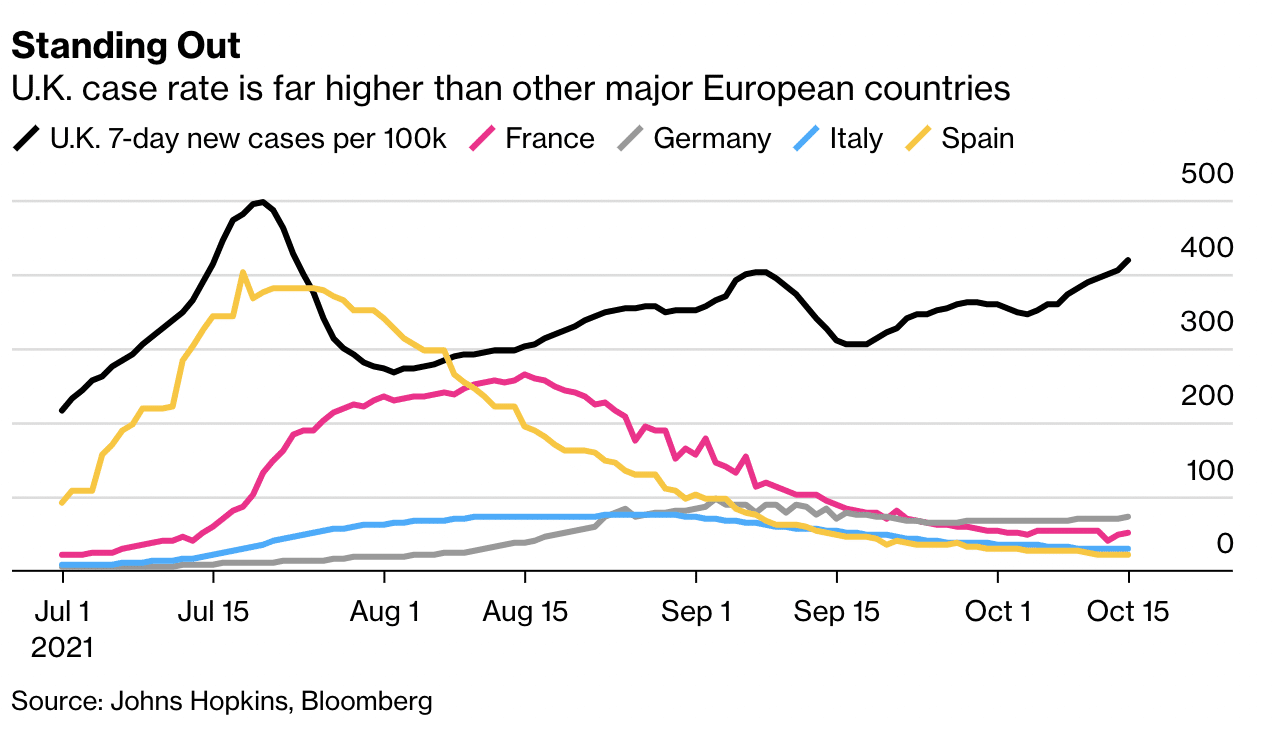Delta Plus Threat: UK Covid Deaths Worst in Europe at 800 a Week
Please note that we are not authorised to provide any investment advice. The content on this page is for information purposes only.
Covid deaths in the UK are nowhere near previous peaks but are nevertheless logging 800 a week over the past six weeks, with the Delta Plus mutation accounting for 8% of sequenced cases.
Meanwhile, infections reached 45,124 on 17 October. Although there is no talk of another lockdown, the ever-present danger of a more virulent and infectious variant emerging has not gone away.
Critics argue that the UK government’s strategy increases the chances of a more deadly mutation in the virus emerging.
Further, a worsening Covid situation could negatively impact the UK’s economic recovery – a recovery that is already being hit by supply and labour shortages that are becoming more acute in the run-up to Christmas shopping.
Last week UK unemployment fell to 4.5% from 4.9% in the previous quarter but job vacancies have reached a record 1.1 million.
“Urgent research” into Delta Plus variant required
In tweets yesterday Scott Gottlieb, the former US Food and Drug Administration commissioner and a Pfizer board member, issued a call for “urgent research” into a mutation of the Delta variant, referred to as Delta Plus.
“We need urgent research to figure out if this delta plus is more transmissible, has partial immune evasion,” wrote Gottlieb.
Delta Plus is now new, having first been detected in India in May. The structure of the Delta Plus strain is what is worrying epidemiologists because its most significant mutation is the K417N. This particular mutation is similar to one seen in the Beta variant and is blamed for making that variant more efficient at spreading reinfection.
Addressing those fears, Gottlieb wrote: “There’s no clear indication that it’s considerably more transmissible, but we should work to more quickly characterise these and other new variants. We have the tools.”
However he added: “UK reported its biggest one-day Covid case increase in 3 months just as the new delta variant AY.4 with the S:Y145H mutation in the spike reaches 8% of UK sequenced cases. We need urgent research to figure out if this delta plus is more transmissible, has partial immune evasion?”
Deaths and infections in the UK are far higher than in France, Spain and Germany, according to the Bloomberg Covid Tracker.

More indoor mixing in the UK is thought to be the reason for the deteriorating Covid situation in the country, with the return of children to school a key driver.
Additionally, the lack of government messaging promoting mitigation measures – such as mask wearing and social distancing, are likely contributing to the widening gap between the UK and the rest of Europe.
Waning immunity a bigger problem in early-starter UK
After being a frontrunner, the UK’s vaccine rollout has slowed to place the country at the back of the pack. And because the UK was the first out of the gate with mass vaccination, it means the problem of waning immunity is likely arising in the UK first. That two-month lead is now a problem, given that the booster programme lags the rest of western Europe.
A slower start on the rollout to younger people is also part of the reason for the UK’s poor performance – the UK started later and is compounding that problem by also proceeding more slowly.
Rollout of the vaccine to secondary school aged children has reached just 30% in the UK, compared to, for example, 80% in Spain.
Vaccines still provide protection but double Oxford/Astra-Zeneca not as effective
Still, Researchers in Germany have found that the vaccines currently provide considerable protection against both Delta and Delta Plus:
“They were able to show that Delta and Delta Plus infect lung cells with higher efficiency than the original virus. In addition, one of four antibodies used to treat COVID-19 was not effective against Delta, and Delta Plus was even resistant against two therapeutic antibodies. Similarly, antibodies generated upon vaccination with the BioNTech-Pfizer and Oxford-AstraZeneca vaccines were also less effective against Delta and Delta Plus compared to the original virus.
“Delta and Delta Plus, on the other hand, were comparably inhibited, suggesting that Delta Plus may not pose a greater risk to vaccinated persons than Delta.
“Finally, it was found that individuals vaccinated first with Oxford-AstraZeneca and then with BioNTech-Pfizer had significantly more antibodies that inhibited Delta than individuals vaccinated twice with Oxford-AstraZeneca.”





